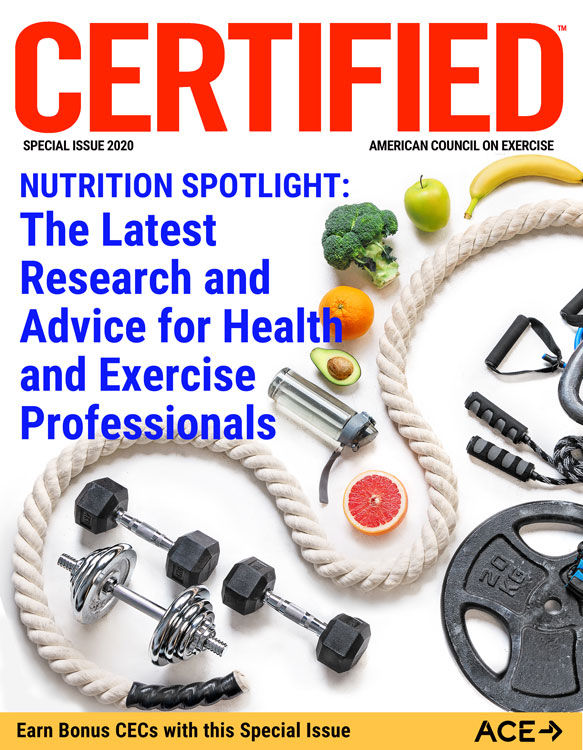
In this series, ACE experts answer your health and exercise questions. From high-intensity interval training to youth fitness, you’ll find detailed answers to many of the questions that may come up in your work with clients. If you have questions you’d like to ask our experts, please email us at Christine.Ekeroth@acefitness.org.
The Expert:
 Dominique Adair, MS, RD, is a private-practice nutrition and fitness advisor, public speaker, educator, media consultant, and freelance health and nutrition writer. Since 1990, she has helped guide hundreds of clients through in-person and digital counseling and has established herself as an internationally recognized speaker on nutrition, metabolism and fitness. Additionally, Adair has worked extensively with the entertainment industry as well as collegiate and professional athletes, specializing in evidenced-based performance nutrition without compromising optimal health. Adair is a member of ACE’s Scientific Advisory Panel and serves as an advisor and on-air commentator to electronic and print media, including the traditional commercial broadcast television networks, as well as CNBC, CNN and others. An avid hiker, cyclist and fitness enthusiast, she lives with her son in New York.
Dominique Adair, MS, RD, is a private-practice nutrition and fitness advisor, public speaker, educator, media consultant, and freelance health and nutrition writer. Since 1990, she has helped guide hundreds of clients through in-person and digital counseling and has established herself as an internationally recognized speaker on nutrition, metabolism and fitness. Additionally, Adair has worked extensively with the entertainment industry as well as collegiate and professional athletes, specializing in evidenced-based performance nutrition without compromising optimal health. Adair is a member of ACE’s Scientific Advisory Panel and serves as an advisor and on-air commentator to electronic and print media, including the traditional commercial broadcast television networks, as well as CNBC, CNN and others. An avid hiker, cyclist and fitness enthusiast, she lives with her son in New York.
Q: Many of my clients are transitioning to a plant-based diet. Is this a good idea and are there any common mistakes that people tend to make when eliminating animal products from their diet?
Plant-based diets are getting a lot of attention in both the medical literature as well as in fitness and wellness media. Before discussing the pros and cons, or any limitations for those whom might most benefit, let’s first define the term. At its most basic, a “plant-based diet” means the majority of the foods included come from plants and that the diet includes fewer animal ingredients such as meat, seafood, milk, eggs or honey. Unlike vegan diets, which eliminate all animal products, plant-based diets as defined for the purposes of this article do not necessarily require the elimination of all animal products; rather, they focus on eating mostly plants, such as fruits, vegetables, nuts, seeds and whole grains. Other terms used to define this approach include plant-dominant, plant-forward and plant-majority diets.
There is excellent scientific evidence demonstrating that the risk of many chronic diseases can be reduced, or possibly even reversed, by adopting a plant-based diet. Rich in fiber, antioxidant nutrients and phytochemicals, plants are loaded with health-promoting, disease-fighting compounds, and are generally free of compounds that might promote disease. In this way plants are a “win-win;” more good stuff, less bad stuff.
Additionally, plant-based diets are associated with healthy weight management, disease prevention and a lighter environmental footprint. Let’s take a closer look at some of these benefits . . .
Weight management: Plants in their whole food form (more on that below) tend to be high-fiber, high-water, low-calorie foods. Eating lots of plants helps many people achieve and maintain a healthy weight.
Disease prevention: One of the ways that diets high in plant foods fight disease is through an anti-inflammatory effect. In recent years, inflammation’s role as a risk factor for various chronic illnesses—including diabetes, heart disease and cancer—has been vigorously studied and described. When unchecked, prolonged chronic inflammation can generate a series of destructive reactions that damage cells which can eventually lead to the clinical symptoms of disease. Essential nutrients and phytochemicals play a key role in combating inflammatory processes. There is strong academic evidence supporting the link between plant nutrients and reducing the risk for chronic disease.
Following are some examples of studies establishing the diet-disease connection:
- A 2018 review study in JAMA Internal Medicine showed that people who ate a mostly plant-based diet reduced their risk of diabetes by 23%.
- Extensive data exists to support risk reduction in cardiovascular disease with diets high in plants.
- While there is less research to support the relationship between cancer prevention and diet, current advice for cancer-risk reduction includes the recommendation to consume adequate amounts of fruits and vegetables in the context of an overall adequate dietary pattern.
"Essential nutrients and phytochemicals play a key role in combating inflammatory processes. There is strong academic evidence supporting the link between plant nutrients and reducing the risk for chronic disease."
One of the first populations studied on the relationship between diet and disease were the Seventh-day Adventists. Created by the Seventh-day Adventist Church, this plant-based diet discourages eating most animal products, as well as foods, beverages and substances deemed to be “unclean” in the Bible. One of the most renowned diet-disease studies in this population is the Adventist Health Study 2 (AHS-2), which involved more than 96,000 Adventists and looked for links between diet, disease and lifestyle. The AHS-2 revealed that those who followed a vegetarian diet had a significantly lower risk of obesity, high blood pressure and high blood sugar—all of which are strong risk factors for heart disease and early death.
A lighter environmental footprint: Research suggests shifting away from animal-based foods would add considerably to the global food supply as well as significantly reduce carbon emissions and waste byproducts that end up in our oceans. Beef, in particular, makes an unsurpassable contribution to greenhouse gas emissions. It uses up land resources and water and causes more environmental damage than almost any other food product. That said, as you will learn below, some plant-based foods also come with a heavy environmental price tag.
Mistakes to Avoid
So, we’ve established that a plant-dominant diet can help people achieve and maintain a healthy weight, prevent or possibly reverse disease and is gentler on the planet. But are all diets rich in plants “healthy” and environmentally sound? Is there anyone who should avoid a plant-dominant diet? Or, are there plant dominant diets that actually are not healthy? Let’s take a closer look.
Most of the research on plant-based diets, along with the aligned recommendations, refer to a “plant-based whole-foods diet.” In fact, both parts of this recommendation—the plant-based and the whole-foods components—are equally important. After all, potato chips, cotton candy and cola are all made from plants, and they’re arguably not the healthiest foods.
One of the best ways to tell if a food is healthy (plant or not) is to see if it passes the nutrient-density test. Nutritionists use the nutrient-density calculation to determine if foods, or even a pattern of foods, are as healthy as they could be. Technically, nutrient density (ND) is the number of essential nutrients (EN) per calorie (ND = EN/calories). To complete this calculation, divide the number of health-promoting nutrients (including vitamins, minerals, fiber and phytochemicals) by the number of calories. (Note: Though not technically a nutrient, phytochemicals can be health-promoting compounds.)
Here’s an example to help clarify this concept. Imagine you have half a sweet potato and a handful of jellybeans. They both have the same number of calories (the denominator) and, in fact, about the same amount of carbohydrate (an essential nutrient). But the potato also has fiber, vitamins, minerals and phytochemicals, while the jellybeans have only carbohydrate (in the form of sucrose and fructose). In this case, the essential nutrients in the potato are greater than the essential nutrients in the jellybeans. Therefore, because they are divided by the same number of calories, the potato is more nutrient dense.
Now consider nutrient density in the context of a plant-based diet. Just because a food or a diet is vegetarian or vegan does not mean it’s healthy. Plant-based foods can vary in quality and nutritional value, and it’s important to choose the most nutrient-dense items as part of a healthful diet.
To help a client shift to a healthy plant-based diet, consider the following recommendations:
- Don’t overprocess your food. Whole, minimally processed foods tend to have the most nutrition and confer the greatest health benefits. For example, choose a piece of fruit rather than fruit juice or a potato rather than a bag of potato chips. Additionally, less-processed plant foods tend to have less sodium and more potassium, a ratio that is extremely important to the maintenance of healthy blood pressure.
- Pattern matters. Ask clients to focus on the entire dietary pattern rather than individual foods. For example, a client who starts eating a few pieces of fresh fruit a day, but also eats a lot of fast food, highly processed foods or restaurant-prepared foods more than a few meals a week, may not benefit as much as someone who shifts his or her dietary pattern to include many more plants as well as fewer processed foods and foods prepared outside of the home.
- Have a plan. Whole-food, plant-based diets require some advanced planning to make sure intake is adequate and to avoid nutrient deficiencies. There are loads of nutrients in plants, but if the selection is too narrow, or it does not include grains and legumes (or some animal products), it may be too low in protein and some vitamins and minerals. Working with a registered dietitian for a session or two to determine nutrient needs and whether the diet is adequate might be a good investment.
- Avoid the boredom trap. As is the case with any dietary program, if it is too restrictive over time, it may become less appealing. People who abandon an overly restrictive pattern may replace it with lots of unhealthy foods that were previously “forbidden.” Over time, the net effect could be a less-healthy diet.
- Choose “green” plant foods. While few foods compare to meat and dairy in terms of their impact on the environment, plants are not without carbon costs. For example, delicate fruits such as berries are often transported via air, while watermelon, which is large, heavy and perishable, is expensive to transport, which increases its environmental cost. It’s important to consider the amount of waste, special storage, packaging and transport demands for produce in terms of its potentially hefty carbon footprint.
"Just because a food or a diet is vegetarian or vegan, does not mean it’s healthy. Plant-based foods can vary in quality and nutritional value, and it’s important to choose the most nutrient-dense items as part of a healthful diet. "
Agricultural practices, such as the tilling of fields, also release large volumes of greenhouse gases into the atmosphere and help to speed up erosion. Additionally, there’s the potential for planet injury environmental consequences from chemical products used in conventional farming. In response, organic farming is widely considered to be a more sustainable alternative when it comes to food production, though this also is subject to debate. The lack of pesticides and enhanced biodiversity results in better soil quality and reduced pollution from fertilizer or pesticide runoff. However, some experts argue that the additional land required for organic farming may leave less land for carbon sequestration. Purchasing locally grown, seasonal produce and paying attention to the way foods are grown and transported seem to be the best possible course.
As more people consider shifting to a plant-based diet, as a health and exercise professional you are in a great position to educate your clients about the benefits and the potential considerations of adopting a plant-based diet. When incorporated into an overall healthy lifestyle, along with stress management and enjoyable physical activity, plant-based diets can be an effective way to live by the philosophy (if not the exact words) attributed to Hippocrates, a Greek physician widely considered to be the father of modern medicine: “Let food be thy medicine.”





 by
by 

 Dominique Adair, MS, RD, is a private-practice nutrition and fitness advisor, public speaker, educator, media consultant, and freelance health and nutrition writer. Since 1990, she has helped guide hundreds of clients through in-person and digital counseling and has established herself as an internationally recognized speaker on nutrition, metabolism and fitness. Additionally, Adair has worked extensively with the entertainment industry as well as collegiate and professional athletes, specializing in evidenced-based performance nutrition without compromising optimal health. Adair is a member of ACE’s Scientific Advisory Panel and serves as an advisor and on-air commentator to electronic and print media, including the traditional commercial broadcast television networks, as well as CNBC, CNN and others. An avid hiker, cyclist and fitness enthusiast, she lives with her son in New York.
Dominique Adair, MS, RD, is a private-practice nutrition and fitness advisor, public speaker, educator, media consultant, and freelance health and nutrition writer. Since 1990, she has helped guide hundreds of clients through in-person and digital counseling and has established herself as an internationally recognized speaker on nutrition, metabolism and fitness. Additionally, Adair has worked extensively with the entertainment industry as well as collegiate and professional athletes, specializing in evidenced-based performance nutrition without compromising optimal health. Adair is a member of ACE’s Scientific Advisory Panel and serves as an advisor and on-air commentator to electronic and print media, including the traditional commercial broadcast television networks, as well as CNBC, CNN and others. An avid hiker, cyclist and fitness enthusiast, she lives with her son in New York.



